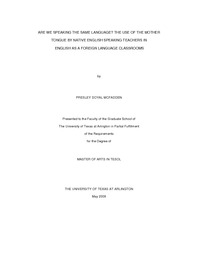
ATTENTION: The works hosted here are being migrated to a new repository that will consolidate resources, improve discoverability, and better show UTA's research impact on the global community. We will update authors as the migration progresses. Please see MavMatrix for more information.
Show simple item record
| dc.contributor.author | McFadden, Presley Doyal | en_US |
| dc.date.accessioned | 2009-09-16T18:16:44Z | |
| dc.date.available | 2009-09-16T18:16:44Z | |
| dc.date.issued | 2009-09-16T18:16:44Z | |
| dc.date.submitted | January 2009 | en_US |
| dc.identifier.other | DISS-10191 | en_US |
| dc.identifier.uri | http://hdl.handle.net/10106/1646 | |
| dc.description.abstract | The question of whether or not to use students' first language in second language acquisition is not a new one (Harbord, 1992; Duff and Polio, 1990). However, the way this question is addressed by the students themselves is rarely found in linguistic publications. This study discusses three dependant variables: The attitude (positive or negative) of EFL students towards their native English speaking teachers' attempts at using students' mother tongue in the classroom; the preferences concerning which pedagogical areas (vocabulary translation, error correction, grammar instruction, etc.) the students find the use of the first language more necessary for, and finally, the affective influence the use of the mother tongue may have on EFL learners. Participants consisted of 228 Vietnamese-speaking subjects learning English as a foreign language at the University of Hanoi. The subjects responded to a modified version of the Strategies in Language Learning (SILL) written by Oxford (1989) that enabled the researcher to examine independent variables that may influence the perceptions and preferences of Vietnamese language use by 5 American teachers working at the University teaching both freshmen and seniors. Variables included year of study, skill studied (reading, speaking, pronunciation, or multi-skilled), city of origin, parents' English profiiciency, and gender. The dependant variables were established by use of a Factor Analysis with reliability and validity of these factors determined by use of Cronbach's Alpha. The present researcher expected, based on recent research (Schweers, 1999; Tang, 2000, Ferrer, 2002) that students would display a favorable attitude towards the use of their L1 by American teachers because it would lower their affective filter, show students that their teachers could understand and explain where their errors may be originating, and reveal an appreciation for the students' culture (Auerbach, 1993). This hypothesis is discussed in qualitative detail, with the words of 11 interviewed students serving as a key points as to why native English speaking teachers should be careful with how much they attempt to speak the students' language in the EFL classroom. | en_US |
| dc.description.sponsorship | Stvan, Laurel Smith | en_US |
| dc.language.iso | EN | en_US |
| dc.publisher | Linguistics | en_US |
| dc.title | Are We Speaking The Same Language? The Use Of The Mother Tongue By Native English Speaking Teachers In English As A Foreign Language Classrooms | en_US |
| dc.type | M.A. | en_US |
| dc.contributor.committeeChair | Stvan, Laurel Smith | en_US |
| dc.degree.department | Linguistics | en_US |
| dc.degree.discipline | Linguistics | en_US |
| dc.degree.grantor | University of Texas at Arlington | en_US |
| dc.degree.level | masters | en_US |
| dc.degree.name | M.A. | en_US |
| dc.identifier.externalLink | https://www.uta.edu/ra/real/editprofile.php?onlyview=1&pid=1558 | |
| dc.identifier.externalLinkDescription | Link to Research Profiles | |
Files in this item
- Name:
- McFadden_uta_2502M_10191.pdf
- Size:
- 443.7Kb
- Format:
- PDF
This item appears in the following Collection(s)
Show simple item record


